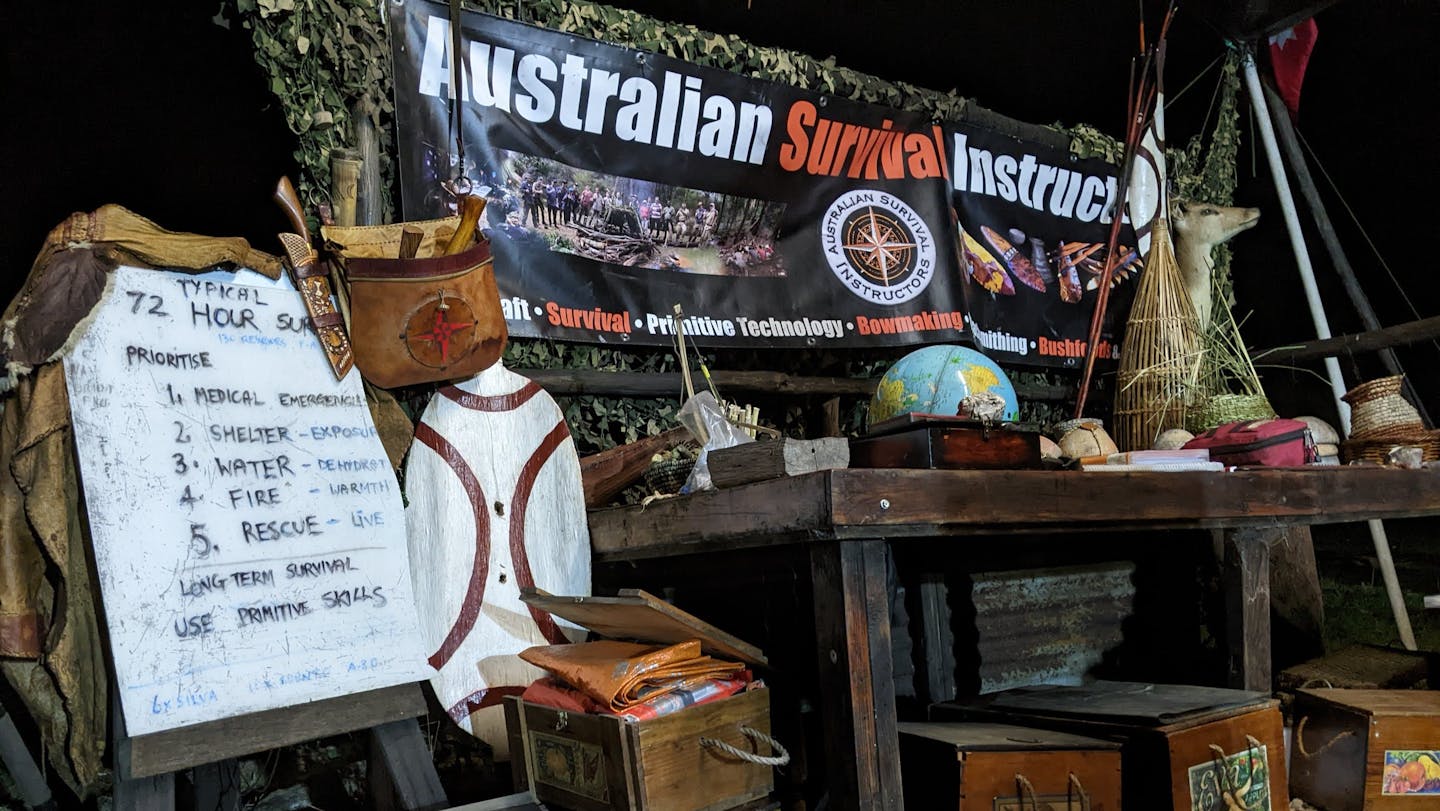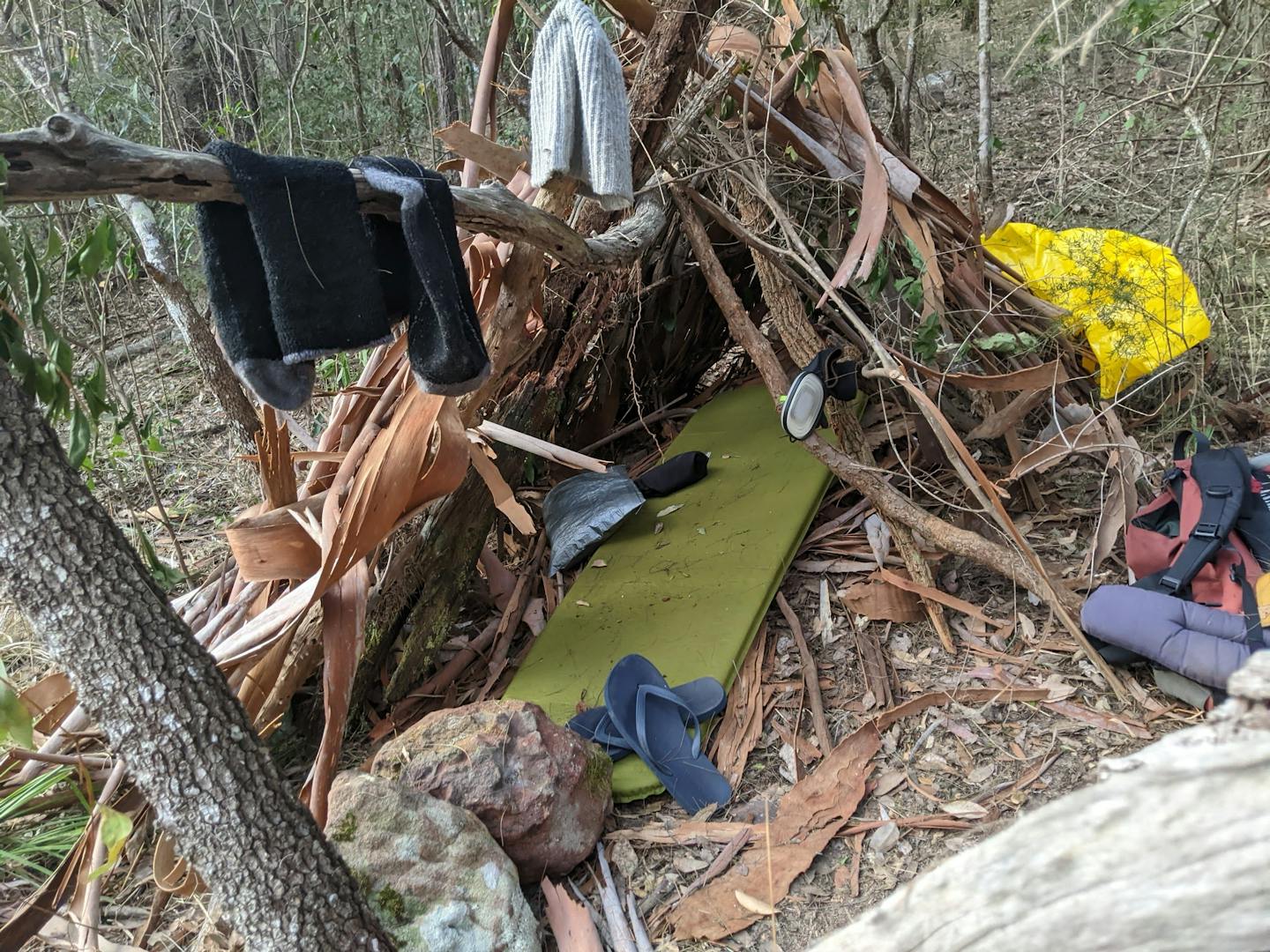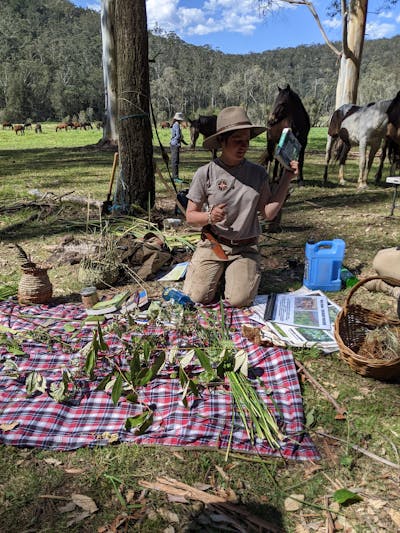
Speculation swirls about fugitive accused double murderer Dezi Freeman’s potential ties to prepper groups and possible doomsday beliefs. There are even questions over whether he’s hiding in a home-made underground bunker.
One Facebook user in a prominent Australian Preppers group wrote:
I don’t like that the prepper community will now be made to look nuts again […] There is zero reason to shoot at police […] We may disagree with some laws but we are also not the law.
So, now is a good time to take a step back and think about what prepping looks like in contemporary Australia, and what it means for our culture more generally.
Who are the people actively living for the end times? Are sovereign citizens the same as survivalists? Are survivalists different from preppers? And what precisely do people mean when they talk about “The End of the Word as We Know It”?
One of us, Tom Doig, has conducted in-depth interviews with 50 preppers across six countries: Australia, India, Indonesia, New Zealand, Sweden and the United States. The other, Jordan McKenzie, is a sociologist whose research areas include dystopian emotions, climate anxiety and doomsday prepping.
We have found that people’s identities, beliefs and everyday practices in this realm sprawl and overlap. It makes sense to differentiate between climate-crisis preppers, religious-fundamentalist preppers and magnetic pole shift preppers (those preparing for catastrophic earthquakes and tsunamis caused by Earth’s magnetic poles suddenly reversing). Yet people can – and do – identify with multiple categories at once, with varying degrees of engagement and seriousness.
Australian preppers exist across the political and class spectrum. Left-wing climate preppers envision ever-increasing floods, bushfires and droughts. More conspiratorial preppers are influenced by various movements – from the anti-vaccination movement that grew during COVID, to chemtrails or secret digital surveillance. Religious preppers tend to be motivated by apocalyptic and end-of-days scenarios.
While far-right, conspiratorial and anti-government (anti the concept of government, not simply anti this government) preppers are a real problem in Australia, they are comparatively rare compared with the US, from where much of the apocalyptic “culture” is imported.
Prepping in Australia is distinctive: less about guns and militias, more about food, water and community. This difference matters, because the threats most Australians imagine are not urban shootouts or civil war. Increasingly, they imagine frequent floods, bushfires, heatwaves and supply-chain breakdowns.
The most “common-sense” form of prepping is basic civil-defence preparedness. Luis Merlo, a Brisbane suburban dad who works as a welder, preps to avoid getting caught out in the next big flood, as he was in 2009. “We lost power for three days,” he said. “I didn’t even have a torch.” He had watched prepper videos but felt unprepared. “And I cursed myself! I thought, ‘How could you let this happen?’”
Other threat scenarios are more baroque. One prepper, “Guy” (not his real name) said he was “working on fitness and my health and getting ready for the shit storm that’s coming”. He worried about “the threats of WW3 and the like”. Guy sent Tom a link to a YouTube video with the title “EMERGENCY BROADCAST – Worldwide Soft Coup Imminent!”.
Many people in this space reject, or resent, having the labels “prepper”, “survivalist” and “sovereign citizen” applied to them, seeing the terms as cliches or harmful stereotypes. Nevertheless, we suggest that four distinct groups can be identified in an Australian context.

Preppers, survivalists and sovereign citizens
It’s hard to estimate how many preppers there are in Australia – partly because the term itself is hard to define, and partly because no quantitative studies have been made.
While roughly 10% of Australians make basic disaster preparations, only a much smaller proportion would qualify as fully fledged preppers. By comparison, 6% of US citizens self-identify as preppers; the figure in Australia is likely to be significantly lower.
Many preppers are secretive or paranoid about their activities and don’t readily admit to being preppers. There are 40,500 members of the Australian Preppers Facebook group (founded by Dezi Freeman’s neighbour, Stephen Mallett). And there are 10,900 members of the “Australian preppers no conspiracies allowed” Facebook group.
Preppers can be defined as people who expect to experience some form of major disruption – from a natural disaster to widespread societal collapse – within their lifetime, and who are taking active steps to prepare for that eventuality.
Many of these scenarios have nothing to do with a malevolent government; rather, preppers often see the state as lacking the capacity to protect its citizens. UK-based geographer Kezia Barker argues
prepping is driven not by a paranoia assumed of survivalists that ‘the government is coming for me’, but by the belief that ‘the government isn’t coming for me’.
Preppers are also more likely to stay put in a disaster scenario – to “bug in” – and hunker down with supplies. Depending on money and motivation, preppers can store smaller or larger amounts of food, water and tools for an imagined catastrophe; in some cases, they invest in actual bunkers.
Preppers can imagine the “the end” as a discrete event, or as an ongoing process, or as both at the same time – that is, ruptures within a longer trajectory of decline and collapse.
For example, Te Wehi Ratana, a Māori climate activist and prepper in Aotearoa New Zealand, admitted “such a huge part of me is waiting for the apocalypse to happen”. When asked, “When is the collapse going to begin?” he responded, “It’s already begun, man!”

Small-“S” survivalists practise bushcraft: shelter-building, fire-building, path-finding, food-foraging. Think scouts; think Alone Australia. At its simplest, this is about going out into the wilderness and not dying.
When newspaper articles quote survival experts saying Dezi Freeman could last for “several weeks” in Victoria’s mountain country, they’re talking about small-“S” survivalism. These practices aren’t ideological in and of themselves, although survival skills can be deployed for a variety of ends, from pig-hunting to “bugging out”.
Big-“S” survivalism is a far-right, anti-government philosophy that originated in postwar US culture, as part of the militia movement. These kinds of survivalists see the future as dystopian, if not apocalyptic. The state is the primary threat. In the face of perceived governmental oppression and “tyranny” – exemplified by conflicts such as the siege of Waco, Texas – survivalist groups believe they need to “bear arms” in self-defence.
Survivalism has a view of history with echoes of colonialism: it fetishises the idea of “surviving” in nature, outside of industrial society.
Sovereign citizens are anti-authority and anti-law. They believe Australia’s laws don’t apply to them (or only apply selectively). They sometimes generate and attempt to enforce their own pseudolaws, or cite archaic legal jargon out of context. For example, “Bunnings Karen” is a sovereign citizen who quoted the Magna Carta as an excuse to not wear a face mask during COVID lockdowns.
Sovereign citizens have a tendency towards confrontation, especially directed at police officers, as the most obvious embodiment of “the law”. The “SovCit” movement originated in the US in the 1970s; it is a reasonably new group in Australia, where it has grown rapidly since COVID.
The divide between preppers, survivalists and sovereign citizens can be understood through each group’s relationship with the nation state.
While preppers may be inclined to work with the state in an emergency, sovereign citizens and (in some cases) Survivalists see their practices as in ideological opposition to the state. Attitudes towards the use of violence are arguably key here.
For sovereign citizens, the authority of the state is fundamentally illegitimate, so acts of violence against state representatives (such as the police, but also the courts, politicians and state bureaucracy) are both justified and ethical.
“You cannot prep in prison…”
On Stephen Mallet’s Australian Preppers page, the chat about Dezi Freeman has been heated, to put it mildly. People are already suggesting the shooting was a “false flag” operation. One anonymous user claimed the whole event is “100% psyop” masterminded by “the gruberment”, with “new gun laws incoming” as a result.
Other preppers are expressing more measured views. “It’s one thing to home school, grow your own food and mind your own business,” they wrote; “it’s another when you think that the common laws […] of the land you live on don’t apply to you and go about breaching those laws.”
But one user’s comments best sum up the tensions within these subcultures:
I love prepping but this group is not about that, is it. You’re sovereign citizens by the sounds. I’m out. You’re nut jobs […]
Prepping in Australia vs the US
In the US, prepping is inextricably tied to gun ownership and use. The figure of the armed prepper is central to how threats (urban crime, civil unrest), safety (self-defence), freedom (Second Amendment rights – or, the constitutional “right to bear arms”, as interpreted by the NRA), and even “the good life” (guns are fun for the whole family!) are imagined.
But in Australia, where gun ownership is comparatively rare and tightly controlled, this imported discourse sits awkwardly. Yes, some Australian preppers echo US rhetoric — especially online. But many go out of their way to distance themselves from it, preferring a more communal, less militarised approach.
For example, the advice from the Australian People’s Survival League is focused on collaboration and prosocial behaviours; more akin to a backup State Emergency Services than a militia. John Scarinci, secretary general of the League, has speculated that a full-scale societal collapse would give rise to “The Marauder Effect” – individuals with caches of weapons disregarding the law and preying on fellow citizens to survive.
“We don’t promote that side of things,” Scarinci said. “We don’t promote breaking the law as a prepper. It’s a great way to potentially land yourself in jail. We are not America. We’re Australia. It’s something to be proud of here.”
In the US, preppers, survivalists and sovereign citizens all tend to prioritise weapons for the simple fact that in a SHTF (shit hits the fan) scenario, those with resources such as food, medicine and shelter are vulnerable to everyone else with a gun. (There are more guns than people in the US.)
In Australia, the comparative lack of guns – less than one tenth of US rates – and radically different ideological connection to guns means those in the prepper and survivalist communities tend to see things differently.
This is an important difference between preppers and sovereign citizens. While preppers are likely to feel the state would fail to protect or provide for them in a SHTF scenario, sovereign citizens oppose the legitimacy and legality of the state altogether. They exist in opposition to the nation state and, in extreme cases, are willing to use violence in an attempt to destroy it.
Crucially, US-style visions of societal collapse, often mediated via Hollywood movies and TV series like 28 Days Later, The Walking Dead and The Last of Us fixate on “urban chaos”. Densely populated areas experience disasters and/or run out of food, before quickly devolving into civil war scenarios, with desperate citizens taking up arms and attacking each other. In this context, “zombies” function as a metaphor for the unprepared masses who become threats to more organised - and, by implication, more deserving of life - preppers.
These narratives are legible within the US, where riots and armed uprisings (such as the January 6 Capitol insurrection) are relatively common occurrences. But they are also imported to Anglosphere countries such as Australia, where some preppers will parrot sentiments about needing to get out of the city “before it’s too late”; (a recent Guardian article on preppers quotes a Facebook comment that “traffic jams and gunfire don’t mix”). This flies in the face of Australian lived experience, where riots and shootings are comparably rare events.
This contradiction came to a head in the 2022 Wieambilla shootings, where the Train family — described in media as “Doomsday Preppers” — murdered two police officers (Matthew Arnold and Rachel McCrow) and a civilian (Alan Dare). Brothers Gareth and Nathaniel Train, and Gareth’s wife Stacey Train, were conspiracy theorists and religious fundamentalists; they ambushed the police officers who had visited the property to investigate a missing persons report about Nathaniel Train.
Their motivations, however, had more to do with far-right religious radicalisation from an online US preacher than with mainstream Australian prepping culture.
Meanwhile, Tom Doig met a senior police officer in Tennessee in 2024, “Joel”, who didn’t see anything wrong with the Trains stockpiling weapons, even after the fatal shootings. He seemed to think the Wieambilla tragedy was just “one of those things”: regrettable, but unavoidable. “Just in general, everybody has a right to bear arms!” he laughed, “there’s no issue with preppers. It’s kind of accepted here. People have a right to do what they wanna do. Until they’re buying high-grade explosives […]”
German sociologist Max Weber argued (Politics as a Vocation) that the state is defined by its monopoly of legitimate violence. This means the group (there can be only one) able to use violence and be deemed legitimate gets to be the state. Only the state can have police, prisons and armies – and when non-state actors use violence, they must be punished to maintain the state’s monopoly of power.
While Dezi Freeman remains at large, his ability to escape arrest presents a very public challenge to state authority, which could inspire others to do the same.
Ultimately, undermining the authority of the state is how sovereign citizens can seek to establish their own rules and regulations.
Slow emergencies
The Dezi Freeman story has already become a mirror for our wider anxieties about social polarisation and state power. The task of figuring out what to do with these anxieties leads many to prepping and other forms of future oriented actions.
Prepping in Australia shades into something more mainstream: ordinary households storing extra food, checking their emergency kits or drawing on community networks during a blackout. These practices speak to a growing sense of climate anxiety, but also to possibilities for resilience and solidarity.
The real question, perhaps, is not whether Freeman is hiding underground – but how the rest of us will prepare for the slow emergencies already unfolding above ground.
This article is republished from The Conversation, a nonprofit, independent news organization bringing you facts and trustworthy analysis to help you make sense of our complex world. It was written by: Tom Doig, The University of Queensland and Jordan McKenzie, University of Wollongong
Read more:
- Pride, pages and performance: Why drag story time matters more than ever
- Repression of climate and environmental protest is intensifying across the world
- How the far right is evolving and growing in Canada
Tom Doig receives funding from the Creative Australia Literature Board for the book project "We Are All Preppers Now"
Jordan McKenzie receives funding from an ARC Discovery Project 'How parents manage climate anxiety: coping and hoping for the whole family' (DP230101928)


 The Conversation
The Conversation
 Associated Press Top News
Associated Press Top News Rutland Herald
Rutland Herald The Pueblo Chieftain
The Pueblo Chieftain New York Post
New York Post The Cut
The Cut The Denver Post
The Denver Post The Outer Banks Voice Community
The Outer Banks Voice Community The Bay City Times
The Bay City Times CBS Sacramento Dixon News
CBS Sacramento Dixon News PennLive Pa. Politics
PennLive Pa. Politics